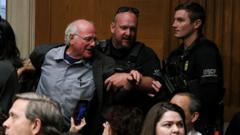Despite being arrested, Cohen emphasized the impact of US policies on vulnerable populations, reigniting conversation around corporate responsibility and political activism.
Ben Cohen, co-founder of the popular ice cream brand Ben & Jerry's, made headlines after being arrested during a protest at a US Senate hearing regarding military aid to Israel and the humanitarian crisis in Gaza. The protest took place while Health and Human Services Secretary Robert F. Kennedy Jr. was presenting testimony.
Cohen was charged with a misdemeanor after disrupting the proceedings alongside six other demonstrators, some of whom are facing more serious charges such as assaulting a police officer. Video footage showed Cohen being escorted out of the Senate building with his hands bound, where he shared his thoughts on social media afterward, stating, "Congress kills poor kids in Gaza by buying bombs."
The police characterized Cohen's charge as a standard response to civil disobedience, highlighting that he was obstructing official proceedings. Ben & Jerry's, known for its progressive stances since its founding in 1978, has faced ongoing tensions with parent company Unilever in recent years, especially after Ben & Jerry's decision to stop sales in the West Bank.
In light of Cohen’s activism, a Unilever representative remarked that his actions were personal and not representative of the company or its policies. This comes amidst a backdrop of legal battles over internal disagreements concerning the brand’s political stances, including their calls for a ceasefire in Gaza and a recent leadership change controversy. As discussions on humanitarian issues and corporate ethics continue, Cohen's arrest serves as a poignant reminder of the complexities involved in activism today.
Ben Cohen, co-founder of the popular ice cream brand Ben & Jerry's, made headlines after being arrested during a protest at a US Senate hearing regarding military aid to Israel and the humanitarian crisis in Gaza. The protest took place while Health and Human Services Secretary Robert F. Kennedy Jr. was presenting testimony.
Cohen was charged with a misdemeanor after disrupting the proceedings alongside six other demonstrators, some of whom are facing more serious charges such as assaulting a police officer. Video footage showed Cohen being escorted out of the Senate building with his hands bound, where he shared his thoughts on social media afterward, stating, "Congress kills poor kids in Gaza by buying bombs."
The police characterized Cohen's charge as a standard response to civil disobedience, highlighting that he was obstructing official proceedings. Ben & Jerry's, known for its progressive stances since its founding in 1978, has faced ongoing tensions with parent company Unilever in recent years, especially after Ben & Jerry's decision to stop sales in the West Bank.
In light of Cohen’s activism, a Unilever representative remarked that his actions were personal and not representative of the company or its policies. This comes amidst a backdrop of legal battles over internal disagreements concerning the brand’s political stances, including their calls for a ceasefire in Gaza and a recent leadership change controversy. As discussions on humanitarian issues and corporate ethics continue, Cohen's arrest serves as a poignant reminder of the complexities involved in activism today.





















